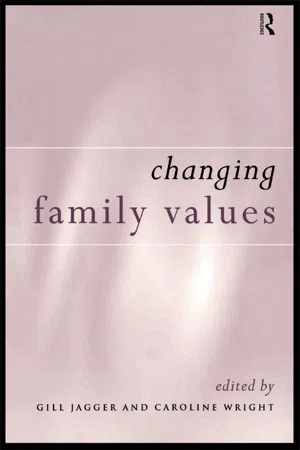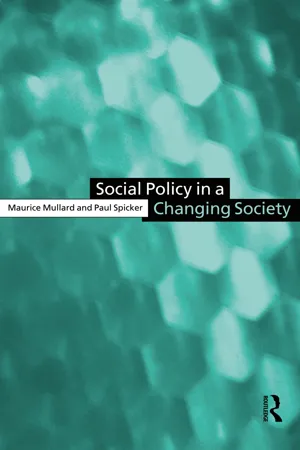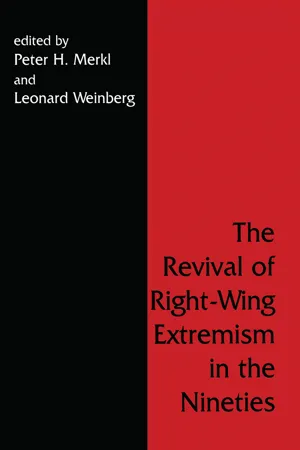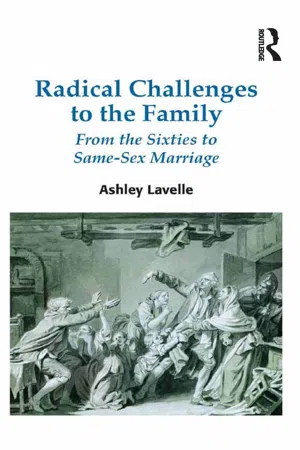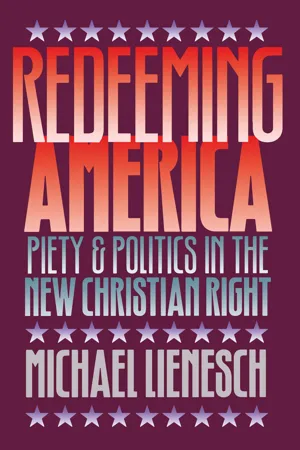Social Sciences
New Right View of the Family
The New Right view of the family emphasizes traditional family values, such as the nuclear family structure and the importance of marriage for raising children. It advocates for limited state intervention in family affairs and promotes the idea of self-reliance and personal responsibility within the family unit. This perspective often aligns with conservative political ideologies and emphasizes the role of the family in maintaining social order and stability.
Written by Perlego with AI-assistance
Related key terms
Related key terms
1 of 4
Related key terms
1 of 3
6 Key excerpts on "New Right View of the Family"
- eBook - ePub
Changing Family Values
Difference, Diversity and the Decline of Male Order
- Gill Jagger, Caroline Wright(Authors)
- 2003(Publication Date)
- Routledge(Publisher)
On a social constructionist view of the family, the New Right’s emphasis on biological relationships is part of an attempt to control ties that do actually exist within society through shaping people’s discourse about, and evaluation of, them. If the account I have given of the way the family and nation play crucially related roles in New Right thinking is correct, then the reasons why families and nations so structured and conceived should exist is reasonably clear. The existence of the nuclear family with its private sphere of responsibility justifies a minimal state that allows maximum scope for the accumulation and application of private capital. But it also reproduces and legitimises the nation-state, which otherwise either lacks a long term basis or threatens to become more than minimal. The social agents responsible for the family’s discursive formation are those who hold political power—the power to control government in their own interests, which, in this instance, are supposedly secured by nation-states of a minimalist tendency. In that case, though, the family’s attractions look decidedly suspect, the values it offers questionable.It is the naturalism, and more especially the biologism, of the New Right’s conception of the family that is unacceptable, and in any case, nothing follows from merely biological facts about our drives and their outcomes as to what it is good or right to do.17 Yet it is on such foundations that the New Right constructs a conception of paternal responsibility that derives wholly from biology and owes nothing to a mother’s claim on behalf of her child, a claim arising from the presumption of a supportive relationship surrounding the act of conception.18 Notice how crucial for the New Right is the ascription of responsibility for child support to biological fathers. The male line must be maintained, even when the traditional families that sustained it have been irredeemably shattered. For if the male line is undermined then women - eBook - ePub
- Maurice Mullard, Paul Spicker(Authors)
- 2005(Publication Date)
- Routledge(Publisher)
The New Right uses individualistic arguments in relation to the market, but often uses conservative arguments when considering social relationships, like the position of the family or the importance of social order. It does not seem to matter very much that the positions are based in different intellectual premises, or that they conflict in practice, because they are consistent in another way: both are used to support an idealised status quo, to resist people who argue for social change, and most importantly to object to intervention by government or the state. - Peter H. Merkl, Leonard Weinberg, Peter H. Merkl, Leonard Weinberg(Authors)
- 2014(Publication Date)
- Routledge(Publisher)
In this chapter, I will argue that the New Right does not simply represent ‘modernization losers’ since most of their supporters are not ‘losers’ in any objective sense. Although a correlation between mass unemployment and the emergence of a significant radical right exists in various parts of modern European history, it is not primarily the unemployed or those facing immediate lay-offs who support the New Right. Moreover, the New Right cannot be reduced to the revival of antidemocratic extremism, because in rhetoric and in behaviour they are as much pro- as they are anti-system. Finally, a perspective which focuses on economic changes and variables overlooks the aspects of individual-level and cultural change, which have contributed significantly to the reconfiguration of the political spectrum in Western societies.Instead, the New Right is conceptualized as a radical reaction to fundamental social and cultural changes in Western societies. The vast literature on political ideologies suggests that the left–right or liberal–conservative schema reflects fundamental orientations towards politics and society and that the underlying dividing line is to be found in attitudes towards change. Karl Mannheim has emphasized that conservative and progressive thought were established as the two socially based and mutually related Weltanschauungen in the modern world. They are a result of the differentiation of the traditional feudal order into diverse classes, interests, and ideologies and the emergence of bourgeois society.2 Only this challenge to the established order and its hitherto unquestioned underlying norms and beliefs could bring about a ‘conservative’ consciousness that ‘discovered’ its interests in defending or even restoring these norms and the order, that is, that transformed them from an unpolitical traditionalism of ‘eternal’ values and institutions into objects of political conflict.Following Mannheim’s approach, conservatism is defined not simply as an anti-modern movement but as the dialectical counterpart to political modernization (democratization, emancipation, self-government, equal rights, and so on), which becomes mobilized in processes of differentiation and accelerated change. In consequence, conservatism cannot be reduced to so-called eternal conservative values but, like all other political ideologies, must be specified within historical conflict constellations. With the nationalist revolutions of the nineteenth century, conservatism involved the upper classes against the liberalism of the rising bourgeoisie. With the Industrial Revolution a new cleavage emerged in which the conservative bourgeoisie and remnants of the old order united against the workers’ movement and its claim for participation and economic redistribution.3 ‘Left’ became associated with the lower classes and allied elites which strove to change society in a more self-governing, egalitarian direction, whereas ‘Right’ was associated with maintaining and defending the status quo- eBook - ePub
Radical Challenges to the Family
From the Sixties to Same-Sex Marriage
- Ashley Lavelle(Author)
- 2016(Publication Date)
- Routledge(Publisher)
Introduction Radical Challenges to the Family in a Contemporary Context
DOI: 10.4324/9781315603445-1The family sits high in the pecking order of the bedrock institutions of modern capitalist society. In the less war-torn zones of the world, the image of Mum, Dad, children, and ‘Rover’ the dog, nestled in the heart of sleepy suburbia behind picket fences encasing well-tended lawns, remains a potent social symbol. But the family is not just a façade, a marker of success, or even merely a source of companionship in a lonely and cut-throat world. It is also a key contributor to the perpetuation of capitalism, with all its manifest degradations. Hence the tendency of pro-capitalist conservatives to leap to the family’s defence against perceived threats – from lesbians and gays, to single mothers, to pornography. The neo-conservative Irving Kristol thus regarded the family and religion as ‘indispensable pillars of a decent society’ (Kristol 1983 , 77). Similarly motivated to safeguard the institution was Christian counselor Henry Brandt who, upon hearing that one million divorces had been filed in the US in the year of 1975, warned: ‘If this trend continues, our entire country is going to be in turmoil. Saving the American home is one of the greatest things we as a society can do’ (Brandt, cited in ConventioNews 1977 ).Defending the family has not only been a preoccupation of outright conservatives, right-wingers, and reactionaries. Those on the so-called ‘centre-left’ of politics have also been among its strident defenders. Former New Labour Prime Minister Tony Blair1had declared in 1995, prior to taking power, that the ‘only way to rebuild social order and stability is through strong values, socially shared, inculcated through individual and family’ (cited in McKinstry 1998 ). The symbolism of the family has also been part of the progressive veneer of the Rhetorical President Barack Obama. He and his beaming wife, angelic daughters, and pet canine ‘Bo’ comprise the First Family of the United States. The closest thing to a royal family that side of the Atlantic, it conveys an image of irreproachable warmth and purity – in spite of the commander-in-chief’s authorisation of drone attacks offshore that kill family members stone dead in their beds (Ackerman 2013 - eBook - ePub
Redeeming America
Piety and Politics in the New Christian Right
- Michael Lienesch(Author)
- 2014(Publication Date)
- The University of North Carolina Press(Publisher)
2. Family
Dear to the heart of Christian conservatism lies the family. Surrounding the self, connecting it to and protecting it from society, the family is considered by religious conservatives to be the most important of social institutions. Unlike many of their conservative counterparts, they have embraced the family as a focus of public policy, taking positions on the most intense and intimate of “hearth-and-home” issues, including abortion, homosexuality, and sex education. Considering themselves to be defenders of a besieged Christian culture, they describe the family as a fortress. At the same time, because they think of themselves as soldiers in a struggle to reform secular society, they see it also as a battleground. In either case, they think of the family as fundamental, “the fundamental building block and basic unit of our society,” according to Jerry Falwell, “and its continued health is a prerequisite for a healthy and prosperous nation.”1In spite of its importance, however, writers within the New Christian Right have had difficulty in defining the family. Criticizing contemporary conceptions, which they see as aberrant and socially self-destructive, they advocate what they call the “traditional” family form.2 Yet among them there is little agreement as to the meaning of the traditional family itself.3 In large part, the absence of agreement is inherent in their ideology, for Christian conservative thinkers draw on several different definitions of the family—particularly prominent are Puritan, Victorian, and postwar images of the family as “church,” “haven,” and “corporation”—combining them into a kind of contemporary collage.4 Although historically confusing, the result is ideologically consistent, a conception of the family in which men rule, women submit, and children obey. In this conception, says John Kater, “the issue at stake is power.”5Religious conservatives have written extensively on the family. In fact, it can be argued that they have treated no other topic so thoroughly. Their books fill the shelves of Christian bookstores, which frequently feature entire sections on family life, marriage, and sexual relationships. The books tend to fall into one of three categories: books about men, usually written by men; books about women, usually written by women, but sometimes also by men; and books about the family, written more often by men than women, and on occasion written by a Christian couple. These books are supplemented by an array of related sources, including sex manuals for married couples, books on dating and sex education for youths, and texts dealing with issues of child rearing and discipline. Autobiographical accounts of family life are also common. Attesting their popularity, many of the books, which tend to be inexpensive paperbacks, boast of frequent printings and massive sales: “National Bestseller,” “#1 Best Seller,” “Over 1 Million In Print.”6 Albeit perhaps inflated, such sales, when taken together with the proliferation of radio and television shows, cassette tapes, and films, along with conferences, seminars, and rallies that focus on family life, suggest a sizable social movement and an abiding concern on the part of Christian conservatives with family issues.7 - eBook - ePub
The Rapture of Politics
Christian Right as the United States Approaches the Year 2000
- Steve Bruce(Author)
- 2021(Publication Date)
- Routledge(Publisher)
Assuming that these four generalizations are correct, we can claim to have identified at least one of the ways by which America’s “culture war” is being fought. James D. Hunter’s persuasive argument (1991:42) regarding this culture war anticipated our findings:The divisions of political consequence today are not theological and ecclesiastical in character but the result of differing world-views. That is to say, they no longer revolve around specific doctrinal issues or styles of religious practice and organization but around our most fundamental and cherished assumptions about how to order our lives.It would seem that of the various dimensions along which our “most fundamental and cherished assumptions” might split into liberal and conservative camps the dimension called here Family Values is the likeliest candidate. The New Christian Right, in other words, is being transformed. It is no longer fundamentalists disagreeing with modernists over biblical inerrancy but moral traditionalists alarmed over divorce, abortion, school curricula, feminism, sexual liberation, and so on. Culturally the line seems to be clearly drawn; the future political consequences of that line, however, would appear to depend upon how much that line also separates the two major parties.REFERENCES
- Hunter, J. D. 1991. Culture Wars. New York: Basic Books.
- Johnson, B. and M. Shibley. 1989. “How new is the new Christian right?,” pp. 178-98 in J. K. Hadden and A. Shupe (eds.), Secularization and Fundamentalism Reconsidered. New York: Paragon Press.
- Lazarsfeld, P. 1959. “Problems in methodology,” pp. 39-78 in R. K. Merton (ed.), Sociology Today.
Index pages curate the most relevant extracts from our library of academic textbooks. They’ve been created using an in-house natural language model (NLM), each adding context and meaning to key research topics.
Explore more topic indexes
Explore more topic indexes
1 of 6
Explore more topic indexes
1 of 4
